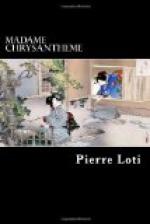Consular residences, custom-house offices, manufactories; a dry dock in which a Russian frigate was lying; on the heights the large European concession, sprinkled with villas, and on the quays, American bars for the sailors. Further off, it is true, further off, far away behind these common-place objects, in the very depths of the immense green valley, peered thousands upon thousands of tiny black houses, a tangled mass of curious appearance, from which here and there emerged some higher, dark red, painted roofs, probably the true old Japanese Nagasaki which still exists. And in those quarters, who knows, there may be, lurking behind a paper screen, some affected cat’s-eyed little woman, whom perhaps in two or three days (having no time to lose) I shall marry!! But no, the picture painted by my fancy has faded. I can no longer see this little creature in my mind’s eye; the sellers of the white mice have blurred her image; I fear now, lest she should be like them.
At nightfall, the decks were suddenly cleared as by enchantment; in a second, they had all shut up their boxes, folded their sliding screens, their trick fans, and, humbly bowing to each of us, the little men and little women disappeared.
Slowly, as the shades of night closed around us mingling all things in the bluish darkness, this Japan surrounding us, became once more, by degrees, little by little, a fairy-like and enchanted country. The great mountains, now all black, were mirrored and doubled in the still water at their feet on which we floated, reflecting therein their sharply reversed outlines, and presenting the mirage of fearful precipices, over which we hung:—– the stars also were reversed in their order, making, in the depths of the imaginary abyss, a sprinkling of tiny phosphorescent lights.
Then all Nagasaki became profusely illuminated, covering itself with multitudes of lanterns: the smallest suburb, the smallest village was lit up; the tiniest hut perched up on high among the trees, and which in the daytime was invisible, threw out its little glow-worm glimmer. Soon there were numberless lights all over the country, on all the shores of the bay, from top to bottom of the mountains; myriads of glowing fires shone out in the darkness, conveying the impression of a vast capital, rising up around us in one bewildering amphitheater. Beneath, in the silent waters, another town, also illuminated, seemed to descend into the depths of the abyss. The night was balmy, pure, delicious; the atmosphere laden with the perfume of flowers came wafted to us from the mountains. From the “tea houses” and other nocturnal resorts, the sound of guitars reached our ears, seeming in the distance the sweetest of music. And the whirr of the cicalas—which, in Japan, is one of the continuous noises of life, and which in a few days we shall no longer even be aware of, so completely is it the background and foundation of all the other terrestrial sounds—was sonorous, incessant, softly monotonous, just like the cascade of a crystal waterfall.




